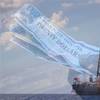RINA Dolphin to Cut Marine Noise
Ships make a lot of noise. Much of the noise is emitted underwater, so passengers and the wider public are often unaware of this. Marine mammals, on the other hand, are very much aware.
Although the long-term impacts of noise on marine mammals are not yet known with certainty, it is clear that increased noise interferes with an animal’s ability to hear. This has serious implications for reproduction and survival.
Ocean noise is a global problem, especially since the amount of shipping is increasing and expecting to expand into new areas such as the Arctic. It is also a growing problem.
The International Workshop on Shipping Noise and Marine Mammals, held in Hamburg back in 2008, highlighted that with the advent of modern shipping, low-frequency ocean noise has been doubling approximately every decade.
These days, it has finally been recognised that sustainable growth and preserving our environment are among humanity’s biggest challenges in the next years. In the shipping sector, the IMO, EU and other regulatory bodies have recently raised the bar, with the aim of making the transport of goods and passengers more environmentally friendly.
Although it receives less attention than other issues such as emissions, noise reduction is crucial to improving the sustainability of cruise ships and lowering their environmental impact.
As an industry, we have to reduce the amount of incidental underwater noise from ships to mitigate the impacts of noise on marine mammals. To achieve this, we need a global effort to reduce the contributions of shipping to ambient noise in the low-frequency (10–300 Hz) range by 3 decibels in 10 years and by 10 decibels in 30 years, compared to current levels. The only way to achieve this goal is to reduce the amount of noise produced by individual ships.
RINA DOLPHIN is an additional class notation that demonstrates particular attention to the marine environment. Specifically, the RINA DOLPHIN notation sets two limits for commercial vessels:
DOLPHIN Transit, for normal seagoing conditions. This is aimed at reducing overall global noise from shipping. DOLPHIN Quiet, for ships travelling at 10 knots. This applies to areas of high environmental importance, for example areas with a high concentration of marine mammals. DOLPHIN noise limits are set in accordance with underwater radiated noise measurements of ships and the results of research projects on this topic.
The benefits of reducing underwater noise are significant, and not only for in terms of ensuring the long-term survival of marine mammals. There are also reputational benefits and, in some cases, commercial advantages such as the Port of Vancouver’s discounted harbour rates for vessels that meet voluntary environmental best practices including the RINA DOLPHIN class notation.













